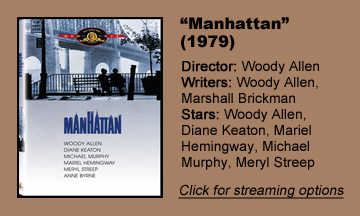Woody Allen isn’t known as a commercial filmmaker, but “Manhattan” (1979) is – at least at first blush – an example of giving people what they want. Audiences already loved Allen and Diane Keaton together, especially in 1977’s Best Picture-winning “Annie Hall,” so here they are together again in “Manhattan.” (Co-writer Marshall Brickman is also back.)
The appeal is much the same, but the film is different enough. Allen’s films can be sorted into groups, but he doesn’t make precisely the same movie twice.
Coming home again
Still, “Manhattan” is comfortingly familiar whereas “Play It Again, Sam” is an exciting hint and “Annie Hall” is a full-blown revelation. Keaton herself, whose Mary is very much the co-star with Allen’s Isaac, reels off self-analysis at an even faster clip than Isaac.
They are both mildly (compared to some previous roles) neurotic and amusing; indeed, Isaac is a TV comedy writer, and she’s also a writer-for-hire. But they have such strong awareness of their own flaws that they are like adult versions of the “Dawson’s Creek” teens from two decades later.
Controversial romance
Speaking of teens, 42-year-old Isaac is initially dating Tracy (Mariel Hemingway), who very much comes off as the 17-year-old we’re constantly reminded she is. How can a middle-aged schlub attract a nubile young woman? Because he’s funny and confident; those traits trump any flaws.
And Tracy, for her part, is not crazy or stupid. Her kid voice gives her away, but Hemingway infuses the role with something subtle: an attempt at maturity by someone who will soon be mature, but isn’t yet. When Tracy says she loves Isaac, it sounds like she has given it some thought. At another point, though, Tracy admits she is a kid.
Say what you will about the intrinsic wrongness of the relationship, but there’s no question Isaac and Tracy make an interesting screen pair. And it’s nice that the problems caused by the age gap are worked out by the couple; wider society need not get involved.
Trading pratfalls for pleasant humor
“Manhattan” doesn’t embrace the humorous possibilities here, but Allen would later get to those in “Whatever Works,” which features an even more absurd age gap between Larry David and Evan Rachel Wood.
Allen and Brickman maybe got the laughs out of their system in previous collaborations (“Sleeper” is another), because “Manhattan” doesn’t go for zingers or pratfalls.
It’s often naturally, pleasantly funny, with a handful of next-level moments, such as when Isaac quits his TV-writing gig on a whim and we smash-cut to him regretting the decision. And a great sight gag comes when Mary’s studly ex, Jeremiah, turns out to be Wallace Shawn. But overall, humor is less of the point here.
Manhattan as Anywhere, USA
The framing mechanism claims that the events are a snapshot of Manhattan life – shot in black and white, because the island is at its most beautiful that way, Isaac claims – but this doesn’t click. The story is about couples being happy in the instances when they are together, then unhappy when one of them breaks it off.

Rinse and repeat, because when Isaac says he’s never had any trouble attracting women, that’s true in this film’s reality. He is pleasantly sure of himself, with only a few neuroses left, as if we’ve caught up with an Alvy Singer who has made serious progress.
This cycle of stories needs not happen in Manhattan; the movie could just as well be called “Earth.” Or “Universe.”
Another minor flaw is Michael Murphy’s Yale, the married love interest of Mary. We never see any notable chemistry between Yale and Mary, largely because we experience most of the relationship via Mary talking about it. Certainly they don’t connect on the level of Mary and Isaac.
When Keaton and Allen share the screen, it’s always a treat. But they are so good together in “Manhattan” that it’s unbelievable there’s even a love triangle to speak of.


